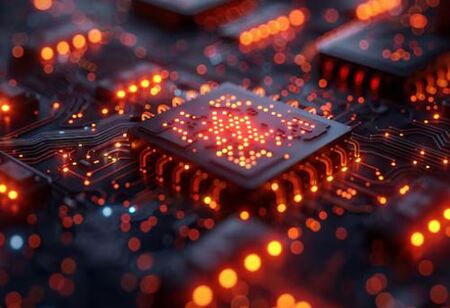
US Chip Policy Shift Boosts Outlook for Samsung, SK Hynix


South Korean chipmakers Samsung Electronics and SK Hynix stand to gain greatly from the recent U.S. decision to remove limitations on Nvidia's AI chip exports to China, especially in the high-bandwidth memory (HBM) market.
The government has given Nvidia permission to export its H20 graphics processing units (GPUs) to China, according to confirmation from US Commerce Secretary Howard Lutnick.
The action aims to increase China's reliance on U.S. technology and is part of larger trade negotiations with Beijing around rare earth elements.
In an effort to restrict China's access to cutting-edge US technology, President Donald Trump banned H20 exports to China in April.
Nvidia had unsold stock as a result of the ensuing export ban, which resulted in a $4.5 billion charge and a $2.5 billion decline in quarterly sales.
Also Read: India & Thailand Emerge as Asia's New Semiconductor Manufacturing Twins
Demand for HBM chips, which power AI accelerators and high-performance servers by processing data more quickly than conventional DRAM, is predicted to increase now that exports are back on track. Nvidia's primary HBM suppliers, Samsung and SK Hynix, are probably going to benefit.
Both HBM3 and the more recent HBM3E memory are present in the H20 chip.
It is best suited for inference tasks, a branch of AI that is expanding quickly, even though it might not be very good at training AI models.
According to reports, Samsung has been providing HBM3 for the H20 since the previous year. However, Samsung's operational profit for the second quarter fell 55.9 percent year over year due in part to the earlier export embargo.
In the meanwhile, the reinstated H20 exports should benefit SK Hynix, which presently controls the largest market share in HBM and was the first to provide Nvidia with HBM3E.
"It's a short-term positive development for the AI GPU and HBM sectors that Nvidia is now able to resume exports to China," said Ryu Hyung-keun of Daishin Securities. "SK hynix is expected to benefit in the near term from the resumption of H20 shipments."
The return of H20 exports to China is anticipated to assist Samsung in increasing HBM sales, despite the fact that the company's fifth-generation HBM3E has not yet received Nvidia's quality certification.
Also Read: New Strategies Powering up Japan's Electric Vehicle Future
Nvidia's next low-end AI processor for the Chinese market, the B40, which is anticipated to be released later this year, will also be advantageous to Samsung. The B40 will use GDDR7, a next-generation graphics DRAM that can process more data at once than traditional DRAM, in contrast to the H20. The industry's first 12-nanometer, 24-gigabit GDDR7 chip was created by Samsung.

